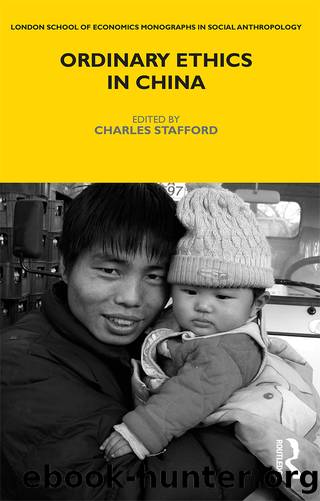Ordinary Ethics in China by Charles Stafford

Author:Charles Stafford [Stafford, Charles]
Language: eng
Format: epub
ISBN: 9780857854605
Goodreads: 17014874
Publisher: Bloomsbury Academic
Published: 2013-02-01T00:00:00+00:00
Notes
1. I use 'fatherland' just for the sake of the pun with Petain's slogan. In reality, it is a more difficult question whether the Chinese words for nation (zuguo, the 'ancestral country') and state (guojia, the 'country-family') should be translated as 'fatherland'. The connotation of the 'father' in the English and French words is not present in the Chinese words, which are more obviously related to the family. It seems that most Chinese would translate it into English as 'motherland'.
2. Not aiming at a comprehensive definition, the 'rough distinction' between rhetorical and situational irony nevertheless serves, Lambek suggests, to 'offset the assumption . . . that irony is properly to be consigned to the rhetorical, as an intentional mode of presentation' (2004: 2). Lambek's text is the introduction to the edited volume Irony and Illness (Lambek and Antze 2004). Another collection of essays I take major inspiration from is the volume Irony in Action (Fernandez and Huber 2001).
3. All names of persons and places below the prefectural level are pseudonyms.
4. Chinese words are written italicized in the standard Pinyin form. Words in the Enshi dialect that markedly differ in pronunciation and meaning from standard Mandarin (putonghua) I have marked with an 'E'.
5. Since family planning has been enforced in the 1980s, most families have one or two children only. Adam Chau describes similar discourses of 'redhot sociality' in rural Shaanxi (cf. Chau 2006, Chapter 8).
6. The word 'liumang' can be translated as hooligan, thug or rogue. The etymological origin of the word is 'floating people' who don't have a stable profession and who don't have a home. Criminals, beggars, ghosts and foreigners might fall into this category.
7. 'Xiong' means 'evil, ferocious, inhuman' in standard Chinese. In the Enshi dialect the word is also used as meaning 'capable, tough and tremendous'. Another word often used in similar contexts in standard Chinese would be lihai. The character 'li' means sharp, fierce and dangerous; it can also mean 'evil ghost', as in 'ligui'. Both words are often used to 'compliment' some extraordinary achievement or attribute, and both connote some moral ambiguity: that which is inhuman (such as ghosts and criminals) can be the source of awe but also fear.
8. The opposite of the jianghu would be the miaotang, i.e. the life of 'temple' and court, the realms of the official discourses of family and government. From the perspective of the jianghu, the miaotang is seen as full of compromise, cowardice, submission and moral corruption, whereas in the jianghu absolute morals and absolute loyalty reign.
9. One basic rule of fengshui is that a grave and a house should have a slope at its back and a free view on the front side.
10. As given in Chinese peasant almanacs, every year, month, day and hour has attached to it two Chinese characters. The 'eight characters' of the birth hour result from the combination of two characters for the year, two for the month, two for the day and two for the hour.
11. The best example
Download
This site does not store any files on its server. We only index and link to content provided by other sites. Please contact the content providers to delete copyright contents if any and email us, we'll remove relevant links or contents immediately.
american english file 1 student book 3rd edition by Unknown(616)
Phoenicians among Others: Why Migrants Mattered in the Ancient Mediterranean by Denise Demetriou(612)
Verus Israel: Study of the Relations Between Christians and Jews in the Roman Empire, AD 135-425 by Marcel Simon(595)
Caesar Rules: The Emperor in the Changing Roman World (c. 50 BC â AD 565) by Olivier Hekster(582)
Basic japanese A grammar and workbook by Unknown(580)
Europe, Strategy and Armed Forces by Sven Biscop Jo Coelmont(523)
Give Me Liberty, Seventh Edition by Foner Eric & DuVal Kathleen & McGirr Lisa(500)
Banned in the U.S.A. : A Reference Guide to Book Censorship in Schools and Public Libraries by Herbert N. Foerstel(492)
The Roman World 44 BC-AD 180 by Martin Goodman(479)
Reading Colonial Japan by Mason Michele;Lee Helen;(471)
DS001-THE MAN OF BRONZE by J.R.A(467)
Introducing Christian Ethics by Samuel Wells and Ben Quash with Rebekah Eklund(464)
The Dangerous Life and Ideas of Diogenes the Cynic by Jean-Manuel Roubineau(458)
Imperial Rome AD 193 - 284 by Ando Clifford(457)
The Oxford History of World War II by Richard Overy(456)
Catiline by Henrik Ibsen--Delphi Classics (Illustrated) by Henrik Ibsen(441)
Language Hacking Mandarin by Benny Lewis & Dr. Licheng Gu(413)
Literary Mathematics by Michael Gavin;(409)
Brand by Henrik Ibsen--Delphi Classics (Illustrated) by Henrik Ibsen(399)
